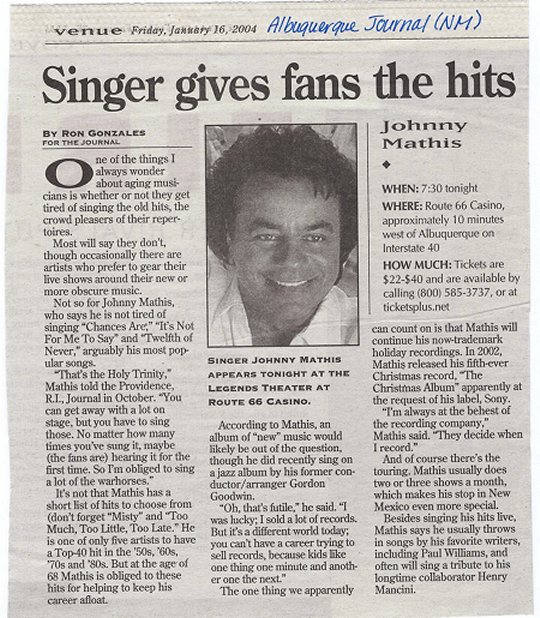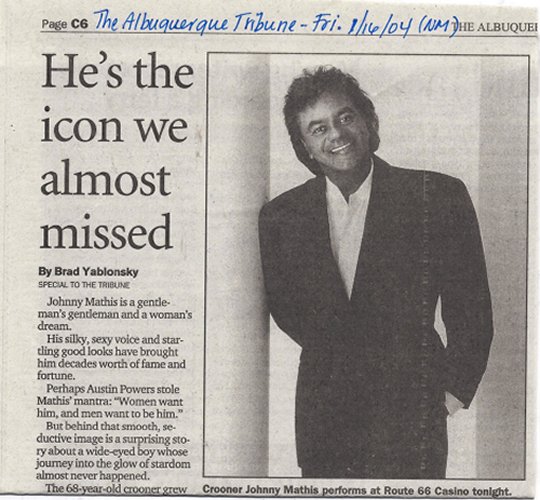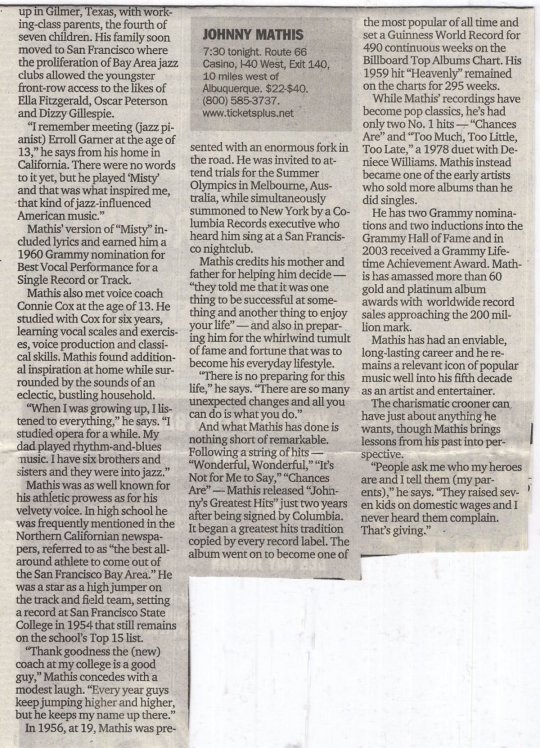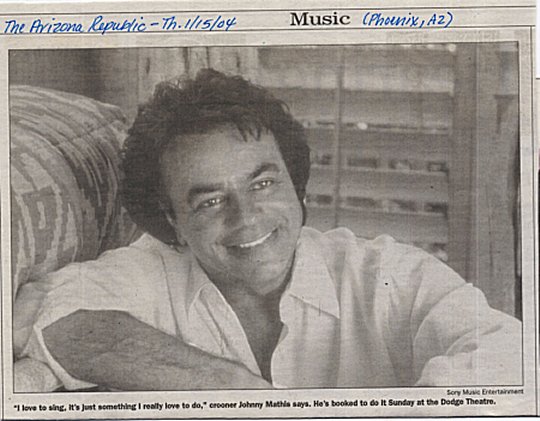
Members may send copies of news articles about Johnny's
appearances and they will appear on this new page. 

Review: Johnny Mathis still smooth as velvet
By Tiffany Yates - Special to the Daily News
Tuesday, January 24, 2006
Think Tom Jones without the bras thrown onstage. The Who without the rioting fans.
No, it wasn't a Lollapalooza concert or the Pope conducting Mass for an exclusive audience. But judging by the giddy reactions of the full house at the Barbara B. Mann Performing Arts Hall, Johnny Mathis' 50th anniversary concert Friday night, you'd be forgiven for making such assumptions.
In his first appearance in the area since early 2003, Mathis trucked out all his classics — "Chances Are," "It's Not for Me to Say," "Twelfth of Never" — and a handful of other immediately recognizable tunes. Mysteriously absent, though, was one of his biggest hits from early in his career, "Wonderful, Wonderful."
Though he self-deprecatingly introduced the standards he's so well-known for, mock-snoring as he promised at the show's beginning to sing his hits, Mathis' appreciative audience greeted each with literal gasps, applause, and even shrieks.
"We love you!" cried one male fan deliriously. "You're brilliant!"
Such mass adulation might seem over the top — especially for an artist some might consider over the hill. At 70, Mathis could enter the territory of certain other stars who continue touring long past the point where they've become caricatures of their former stardom. (We won't name names, but you know who you are, David Lee Roth.)
But the singer whose trademark is his smooth-as-brushed-velvet tone doesn't seem to have lost one whit of his silken sound. Back in his late-'50s heyday, one of Mathis' trademarks was the ethereal floating note that seemed to grow out of nowhere, starting almost inaudibly and finally flowing into the musical phrase.
It was a pretty good trick, requiring a trained voice in top condition. But the senior Johnny can still coax out those pure, sustained notes, holding the mike low and slowly pulling it toward himself, making his trademark grimace as he caresses out the higher notes.
In fact, his entire show is a throwback to the good old days when he was at the height of his popularity. The medley-like progression of songs hovered in familiar territory, for the most part — songs like "Moon River," "Days of Wine and Roses" and his hit "Misty."
And as ever, the still-handsome Mathis was dapperly dressed, even the cut of his suit an older style. Though the diminutive artist's outsized cream-colored jacket, worn after intermission, had him treading dangerously close to the fashion sense of Talking Heads lead singer David Byrne.
Even the orchestra onstage with Mathis harkened back to his glory days: Better than two dozen musicians backed Mathis with strings, horns and even a harp.
But don't think Mathis is resting on his laurels. The singer, who has released two new CDs since the turn of the century, trotted out a few surprises as well, like a fresh arrangement of Brazilian-influenced songs he claimed to have been seduced by in his many travels, a peppier, Latin-sounding set of tunes, some even sung in Portuguese.
The former high-jump champion who once turned down a chance to try out for the 1956 Olympic team in favor of pursuing his musical career still has a playful side, seeming to tease his audience with little-known introductions to some of his classic covers, expertly playing the moment of recognition when — at the first familiar note of almost every number — the audience erupts in applause.
His impressive career has been studded with distinctions: He was the first artist to have a compilation CD released as a "Greatest Hits" album, the first of which spent more than 490 weeks — almost 10 years —on Billboard's Top Album chart, a record noted in the Guinness Book of World Records.
Mathis is also one of only five recording artists to have Top 40 hits in each of the four decades since 1955. He's sung for presidents, prime ministers and royal families; he has a star on the Hollywood Walk of Fame; and has had two inductions (so far!) into the Grammy Hall of Fame, as well as a Lifetime Achievement Grammy in 2003.
Mathis gets hipness bonus points for his choice of "segue act" on this tour: crowd-pleasing comedian Gary Mule Deer ("Not my real name — my real name is Elizabeth Mule Deer," the droll comic deadpans), who holds court for 20 minutes before the intermission.
Mule Deer is a dead-on observer of human foibles and a connoisseur of sheer silliness, a guitar strapped to his shoulder as he machine-guns nonstop jokes, one-liners and misunderstood song lyrics into the mike. Among his best of the latter: from CCR's "Bad Moon Rising": "There's a bathroom on the right." And Skynyrd's Southern torch song "Sweet Home Alabama" becomes "Sweet song about my grandma."
Johnny Mathis has recently netted yet another Grammy nomination, this time for "Isn't It Romantic," released in 2005 in the Best Traditional Pop Vocal Album category, proving he's a long way from washed up.
As he sings in his final number, an encore reprise, Mathis continues to "Let the Good Times Roll."
* EVENT: Johnny Mathis
SNOOP PATROL
"At one point, I did everything in bright earth tones," he says of the three-bedroom, three-bathroom house in Hollywood Hills that has been home base since 1964. It has a full-size indoor pool onto which most of the other rooms in the house open.
As for his other experiments: "There was a period in which I was very much interested in the indigenous artwork of Africa and Asia. Currently, I'm at it again. This time, I'm having most of the flooring in the house done in bamboo."
His all-time decorating nightmare? "Having the house completely finished and having no redecorating projects to oversee."
For the upcoming Rosemont performance, Mathis will be backed by the 62-piece Chicagoland Pops Orchestra. At home, things are a bit quieter. "I live alone," he says, "but my housekeeper, Marcia, has taken good care of me for over the past 35 years."
1. One thing on your nightstand: The current book I'm reading, "Tommy Dorsey: Livin' in a Great Big Way," a biography by Peter J. Levinson.
Mathis' latest, greatest hit: Bamboo flooring
By Nina Metz
Special to the Tribune
Chances are Johnny Mathis is a man who appreciates change. The 71-year-old crooner, who comes to the Rosemont Theatre on Saturday -- where he will perform his greatest hits, including "Chances Are" -- may be known for his smooth vocals, but when it comes to hearth and home, Mathis is actually a little restless. No decorating decision is sacred; when the mood strikes, it is out with the old and in with the new.
2. One thing on a wall in your living room: An artistically hand-painted surfboard. I'm not a surfer, but I thought a surfboard would fit in beautifully in the pool area. The artist is Neilani Werner from the Miami area. She does some beautiful surfboards as well as other paintings, and I chose one of her boards because the tropical theme was exactly what I was looking for.
3. Three condiments we would find in your refrigerator: Tabasco, mayonnaise and Dijon mustard.
4. Three things we would find in your medicine cabinet: Vitamins, cholesterol medication and throat lozenges.
5. Maker of your everyday dinnerware: Fiesta Ware in a variety of bright colors.
6. Maker of your fine china: Portmeirion, [the pattern is] Botanic Garden
7. What is the biggest collection in your home? I love all kinds of music and have a large variety on albums as well as CDs. Some of my favorites are Nat King Cole, Lena Horne, Sarah Vaughan and, most recently, I've been enjoying the music of Dave Koz.
8. Favorite room in the house and why: My bedroom, mainly because almost everyday I'm awakened by a gorgeous panoramic view of the L.A. sunrise.
9. If we looked under your bed, what would we find? The bed is on a platform so there's nothing under it.
10. Do you do any friendly snooping when visiting the homes of others? I like to do it to get new ideas for my own home. I found an excellent air freshener once by a little "snooping."
home&garden@tribune.com
Bette Midler has always struck me as being a singer out of her time. She reminds me of a torch singer from the 1940s. I wouldn’t go as far to say that she puts me in a mind of Rosemary Clooney, but I can definitely see her in that time frame. She now turns her talent to a Christmas album.
She tackles a bevy of classic Christmas tunes, including “Merry Christmas,” “Cool Yule,” “Have Yourself a Merry Little Christmas,” “I’ll Be Home for Christmas,” “O Come, O Come, Emmanuel,” “Mele Kalikimaka,” (a personal favorite but I still like Der Bingle’s better), and “White Christmas.” She also duets with Johnny “Mr. Christmas” Mathis on “Winter Wonderland/Let it Snow! Let it Snow! Let it Snow!” There’s also a newly arranged version of her hit “From a Distance” that’s been decorated with lyrics appropriate to the holiday season.
She contributes a New Year’s song called “What are you Doing New Year’s Eve?” (You were expecting Auld Lang Syne I bet). Of all the Christmas CDs that came across the old reviewing desk, Mrs. Midler’s was the only one that had a version of “White Christmas.” I was expecting them all to try their hands at it (it’s the most done Christmas song ever!) but only Bette attempted it (and wonderfully I might add).
She does add a new introduction in her own style. Her duet with Johnny Mathis is worth the purchase price alone (“Baby, It’s Cold Outside” was done on the other albums I guess). Not only is she an actress, she’s a fine songstress and you’ll enjoy getting this CD. It will put you in the holiday spirit, in a jazzy, 1940s torch singer sort’ve way.
Johnny Mathis sticks to his style, set to sing.
By Joshua Rotter
Johnny Mathis should never have achieved his level of success and longevity.
Think about it: Mathis emerged as a traditional romantic balladeer in 1957, just as raucous early rock 'n' roll was changing the cultural landscape forever. He recognized that shift and simply pursued his own, intimate sound.
"I knew my music was from an earlier age - not for the masses," said Mathis, 71. "It was for people who liked my kind of singing. When I went to New York to make my first record, I thought about singing in a nightclub to 50 or 60. I enjoyed the intimacy of a small group of people."
Concert preview: Johnny Mathis
When: 8 p.m. Friday
Where: Bob Hope Theatre, 242 E. Main St.
Admission: $62.75-$87
Information: (209) 337-HOPE
History has demonstrated the wisdom of Mathis' no-frills approach, which will be much in evidence Friday as he performs at the Bob Hope Theatre.
"One thing I do is try to keep a low profile," Mathis said. "I come on with no hoopla, do a minimum amount of talking and let the music flow."
Raised in San Francisco, Mathis studied voice for six years, perfecting his sustained notes and heavy vibrato, before coming to the attention of George Avakian, then head of jazz A&R at Columbia Records. Avakian liked what he heard and had Mathis cut a jazz album, "A New Sound in Popular Song" (1956), that languished on store shelves.
To up Mathis' commercial appeal, Columbia switched him to romantic ballads the following year. He went on to score four hits in 1957 - the top 20 "Wonderful! Wonderful!" and the top 10 "It's Not for Me to Say," "Chances Are" and "The Twelfth of Never."
Established on radio, Mathis then emerged as a leading album artist; it was not uncommon for him to have four collections simultaneously on the Billboard chart. His early retrospective, "Johnny's Greatest Hits" (1958), spent 10 years on the charts.
Mathis continued to score hits such as "Misty," "Gina" and "What Will Mary Say" before the British Invasion arrived to change pop music once again. By then, Mathis was a star, an artist at home onstage and in the studio singing for fans who knew what to expect. He returned to the charts in 1978 with "Too Much, Too Little, Too Late," a No. 1 duet with Denice Williams.
In the '90s, Mathis' fifth decade with Columbia, he released the Grammy-nominated "In a Sentimental Mood: Mathis Sings Ellington" (1990) and "Because You Loved Me: Songs of Diane Warren" (1998). More-recent discs have included "Johnny Mathis on Broadway" (2000) and the Grammy-nominated standards collection "Isn't It Romantic" (2005).
This year, Mathis' 50th in the business, already has included collaborations with Bette Midler, Dave Koz and Mannheim Steamroller. A PBS special is set for December.
Looking back over those decades, Mathis said his choice to focus on the music he knew rather than the trends has served him well.
"I never saw myself as being in a business," Mathis said. "I just let the music do the work, and I was very lucky. I sang what I wanted to and how I wanted to and still sold records."
Contact Joshua Rotter at features@recordnet.com
Special to The Record
October 12, 2006 6:00 AM
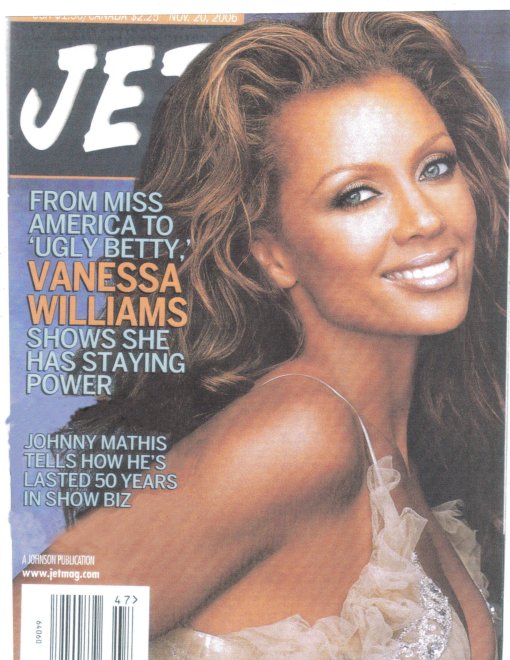

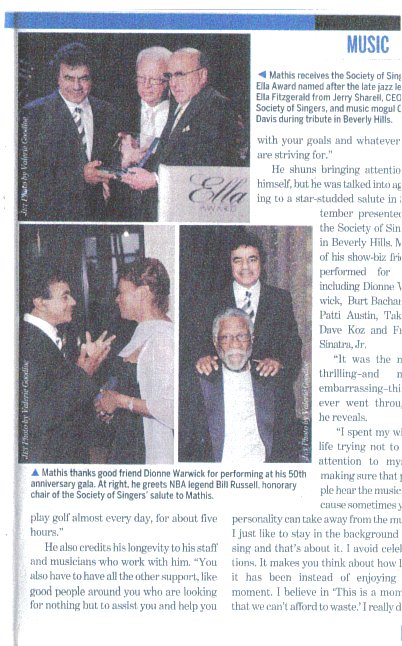

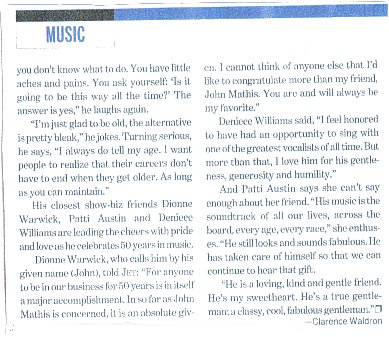
By Jaime Diaz
Golf Digest
December 2006
Johnny Mathis remembers meeting Woods backstage before Tiger's now-historic appearance at age 2 on "The Mike Douglas Show."
"Tiger's an inspiration for anyone who loves their craft," says Mathis, who started playing in his 20s, and now, at 71 and a member at Riviera, plays several times a week. "He has what the great entertainers have: Total concentration to be as good as he can be all the time. He cares little about celebrity. In fact, celebrity gets in the way. He's so busy just trying to learn golf. Musicians really respect that."
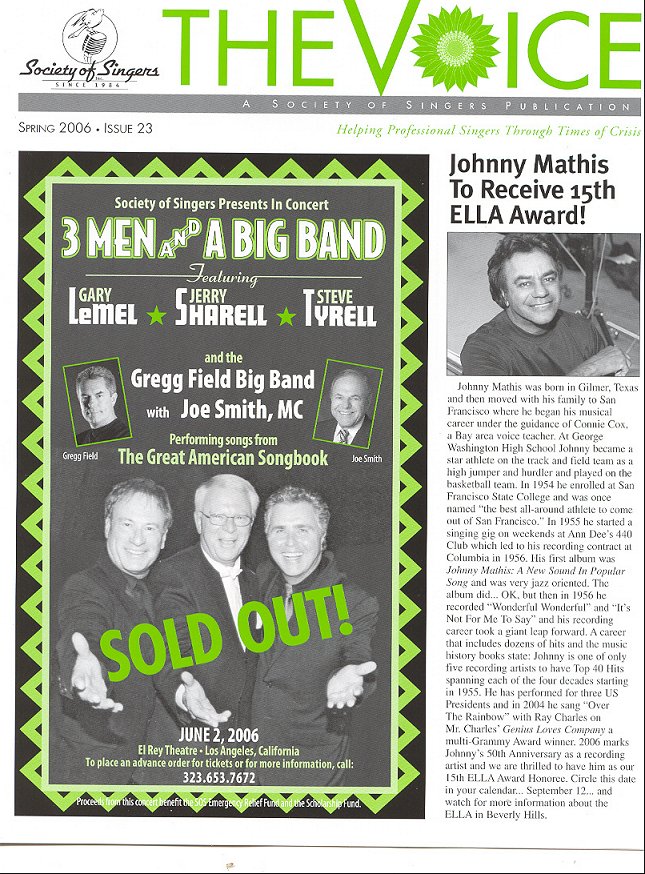






This is sheet music from 1958. Fan's dear father
taught her how to play the piano with many songs.
This was one of them. Her
Dad was very kind and she says that
Johnny Mathis reminds her of her dad. This is the original.
National Public Radio
National Public Radio
News &Notes with Ed Gordon
September 7, 2005
Interview: Johnny Mathis comments on his career
Edition: 9:00-10:00 AM
Article Text:
ED GORDON, host:
We, of course, will continue to cover the devastation and aftermath of Katrina. But now we turn our attention to the lighter side. For almost half a century, people have fallen in love to and fallen in love with Johnny Mathis' signature sound. Mathis is best known for light, swinging, romantic ballads, but his latest CD includes many kinds of music, including Tin Pan Alley standards, show tunes and bossa nova classics.
(Soundbite of music)
Mr. JOHNNY MATHIS: (Singing) It's not for me to say you'll always care.
I sang when I was a little kid. I started singing actually in public when I was about five or six.
GORDON: I've read that 2006--and this is hard to believe--will mark your 50th year in show business. Is that right?
Mr. MATHIS: Fifty years of probably recording, yeah.
GORDON: Let me ask you this, before we get into your latest project, Johnny Mathis really has crossed so! many social, economic, race boundaries through his years. I think that some would be very surprised that you are a native of Texas.
Mr. MATHIS: Yeah. Well, I was born in Texas, born in a little town called Gilmer, but my dad had the good fortune of moving all of us--I have six brothers and sisters--and he moved us to San Francisco, and I grew up there. I sang in jazz clubs and then at a very early age, I met people like Lena Horne and Billy Eckstine and Miles Davis and Dizzy Gillespie. Many, many of them are still very, very close friends of mine to this day.
(Soundbite of music)
Mr. MATHIS: (Singing) Chances are, 'cause I wear a silly grin the moment you come into view.
GORDON: You had a number one hit with "Chances Are." Some almost 21 years later, you and Deniece Williams had another number one hit, "Too Much, Too Little, Too Late."
(Soundbite of "Too Much, Too Little, Too Late")
Ms. DENIECE WILLIAMS and Mr. MATHIS: (Singing) Too much, too little, too late to ever try again. Too much, too little...
GORDON: And that again goes to that longevity, and much of that, I think, has to do with the material you pick, which gets me into the latest project. Talk to me about why you decided to do a CD of standards.
Mr. MATHIS: Well, I've been singing standards all my life. All of a sudden, they became popular through Rod Stewart and...
GORDON: Natalie Cole and many others.
Mr. MATHIS:
(Soundbite of music)
Mr. MATHIS: They said, `We want you to sing the most popular songs from the American musical theater that you haven't sung in the past.
(Soundbite of music)
Mr. MATHIS:
I called the office and said, `Have I ever sung that?' and they said, `Oh, yes, you sung that for so-and-so and so-and-so' and so I sat down and finally came up with a list o! f nine songs that I hadn't recorded that were very familiar to the public.
GORDON: Do you have a favorite on the CD?
Mr. MATHIS: Yeah. I do. My favorite is "Dindi" by Tom Jobim.
(Soundbite of "Dindi")
Mr. MATHIS: (Singing) Don't you know, Dindi, I've been running and searching for you like a river that can't find the sea, I could be without you, my Dindi...
And I also like Paul Williams' song, "Rainbow Connection."
(Soundbite of "Rainbow Connection")
Mr. MATHIS: (Singing) ...illusions. Rainbows have nothing to hide...
I like that. I like them all. You know, I rem...
GORDON: So it's almost like asking you about your favorite child, right?
(Soundbite of "Rainbow Connection")
Mr. MATHIS: (Singing) ...connection, the lovers, the dreamers and me. Well, who said that...
GORDON: Finally, let's talk about the tour that you're on. I know that September 8th, you'll be in San Diego at Humphrey's Concerts By the Bay. Talk to me about this particular tour and the rigors of touring and whether you still look forward to getting out on the road.
Mr. MATHIS: Well, that's a very bittersweet thing with me. Oh, traveling used to be kind of glamorous. You know, you dress up and you'd go to the airport and people would maybe take a picture of you walking off the airplane. But it's gotten so rigorous and so difficult now that it is, in fact, the most difficult thing that I do. The concerts that I do, I try to at least get a direct route or I try to sing a little bit closer to home, which is what I'm doing now. I'm singing at Humphrey's, which is a lovely little setting. And then I'm also singing in Cerritos at the Performing Arts Center, which is a wonderful venue. In case people haven't seen it, they should take a look because it's a wonderful place to sing. They can change it and make it into whatever kind of venue they need to. And that's very cool.
(Soundbite of music)
Mr. MATHIS: (Singing) ...that's whe! re you'll find me.
GORDON: Well, Johnny Mathis, it's been a true pleasure. For one who has sustained in, as I said earlier, a business that takes no prisoners and ofttimes throws away who is not the latest hit-maker, you have shown that cream does rise to the top, and we greatly appreciate you being with us today.
Mr. MATHIS: Thank you so much.
(Soundbite of music)
GORDON: Johnny Mathis' new CD is called "Isn't It Romantic? The Standards Album."
(Soundbite of music)
Mr. MATHIS: (Singing) Yes, it's over. Call it a day. Sorry that it had to end this way. No reason to pretend. We knew it had to end someday this way.
Ms. WILLIAMS: (Singing) Guess it's over. The kicks are gone. What's the use of trying...
GORDON: Thanks for joining us. That's our program for today. NEWS &NOTES was created by NPR News and the African-American Public Radio Consortium.
(Soundbite of music)
Ms. WILLIAMS: (Singing) ...so little left for you and me, and it's clear to see...
Ms. WILLIAMS and Mr. MATHIS: (Singing) ...too much, too little, too late to lie again with you. Too much, too little, too late...
GORDON: I'm Ed Gordon. This is NEWS & NOTES.

Music Review
Despite the merciless heat, the fourth annual AAHF drew a crowd estimated by Baltimore police at 510,000 people over the three days. People picked and chose, as I did, what acts to feast their ears upon, from bohemian soul singer India.Arie to Christian R&B group R.E.A.L. (Radically Excited About Life).
Friday night at the Meyerhoff Symphony Hall, legendary pop star Johnny Mathis kicked off the events held to mark the museum's opening with a formal-but-not-quite-stiff concert of old favorites: signature hits and personal picks. Dapper in his crisp black tux, the 69-year-old balladeer slid from one romantic chestnut to another, backed by sweeping arrangements from the Baltimore Symphony Orchestra.
Mathis fared best on the slower material, and there was a lot of it. When the orchestra upped the tempo to bossa nova-type songs vibrant with heavy percussion and punchy horns, the singer's voice seemed a bit overwhelmed. He may not hit the high notes with as much force as he used to, but Mathis' mahogany tone and refined delivery remain marvels. He still croons ballads such as "Misty" and "Days of Wine and Roses" with a wide-eyed tenderness as if he truly believes every syrupy line.
Soundtrack of a heritage
African-American weekend goes from urban to gospel to oldies
By Rashod D. Ollison
Sun Pop Music Critic
Originally published June 27, 2005
Around Baltimore this weekend, you could easily find whatever kind of pop you dig - from schmaltz-frosted balladry to jazz-inflected go-go, from slick urban love songs to funked-up soul jams. Whether it was veteran crooner Johnny Mathis, in town to celebrate the Reginald F. Lewis Museum of Maryland African American History and Culture, which opened Saturday, or theatrical soul singer Ledisi, who performed at the three-day African American Heritage Festival at Oriole Park at Camden Yards, Charm City teemed with sounds of blackness.
It was a grand start for Lewis museum's gala grand opening
Hot Stuff
At the post-concert reception, there seemed to be two hot topics of conversation. First, you had the buzz about all the activities planned at the museum as it opened to the public. Then, there were the raves for Mathis, whose clear pitch-perfect voice sounded exactly the same as it had decades ago, belying his 69 years.
"Wasn't he great?" More a comment than question from George Russell, museum board chair.
"Was anyone else mouthing the words?" Lisa Barnhill wondered, as she confessed to silently singing along to the old standards like "Chances Are," and "Gina." "I knew every word of every song he sang," said Helen Patterson, "I sang along with him. And my [adult] daughter Devy knew every word, too, because I used to sing them to her."
"Johnny was fabulous," agreed husband Doward Patterson.
By Sloane Brown
Special To The Sun
Originally published June 30, 2005
The grand opening of the Reginald F. Lewis Museum of Maryland African American History and Culture got a grand start last Friday night. A sellout crowd filled Meyerhoff Symphony Hall for a concert by Johnny Mathis and the Baltimore Symphony Orchestra.
Several members including MathisMusicLover and GinaII sent in this article from the Greenville News in NC. Thanks.!!
What's not to love?
Posted Sunday, January 23, 2005 - 1:21 am
By Ann Hicks
ARTS WRITER
ahicks@greenvillenews.com
More details
WANT TO GO?
• What: Johnny Mathis in concert • When: 7:30 p.m. Saturday • Where: Peace Center Concert Hall • Tickets: Sold out • Information: 467-3000
Chances are, unless you've gotten your tickets early, your only hope is a standing-room-only admission for Johnny Mathis' Saturday night concert at the Peace Concert Hall.
All the seats are sold out.
Still, you might catch Mathis at the golf course.
An avid player and 12 handicap, he says he's on the fairways daily. But the great melodist's career is also going strong into its fifth decade.
It is said that many a boomer can credit his or her existence to Mathis' romantic crooning, which helped love blossom in the late 1950s and early 1960s.
Think 1956's "Wonderful, Wonderful," "It's Not for Me to Say," and 1957's monster hit, "Chances Are."
Coincidence or not, 1957 was also the most fertile year of the baby boom (1946-1964), with 4,332,000 births, according to the U.S. Census Bureau.
Mention that statistic and the artist just laughs.
"No wonder there are so many boys from that era named Johnny," he says.
And those romantic hits kept coming. In 1959, his chart topper was "Misty," followed by hundreds of romantic ballads, classical standards and Broadway's best — fixed in vinyl and sold in the millions to the record-buying public.
Over the years, Mathis has released more than 100 albums and an equal number of singles in the United States alone, in addition to his many international recordings.
Although he may be the greatest romantic singer of the second half of the 20th century, Mathis is not stuck on himself.
Instead, he's as personable as your best caddie over the phone from his Southern California home.
Pitching the conversation back to his favorite thing in the world, golf, Mathis says, "The sport is very much like performing. It's a thing you do by yourself."
Drawing parallels between life on the golf course and longevity in the music business, Mathis says, "The more you practice, the better you get."
Not to mention, he adds, that golf is something you can do by yourself as much or as little as you want to.
"It's perfect for me."
He started playing at age 30 and says he can't imagine life without his daily game.
As a matter of fact, he adds, all his friends are golfers. "I used to have a few entertainer friends in my life, but they're all dead. I'm down to golfers only."
Cooking is his other passion.
"I have friends who say to me, 'How can you be on the golf course all day long and still have time to go home and cook a scrumptious meal?'
"I tell them I enjoy it, that's how. My mom and dad were professional cooks, and they taught my six brothers and sister at a very early age how to make a great meal."
His parents also saw to their children's early musical education, he says. Singing was not only encouraged, but pretty much mandatory, the singer says with a laugh.
The old upright piano in the family's small San Francisco home was hardly idle. When visitors came to the house, Mathis says, his father would ask him to entertain them.
"All that practice came in handy later," he says.
And how.
George Avakian, head of jazz recordings at Columbia Records, discovered Mathis in 1955. He came to hear him sing at the invitation of a California jazz club's owner.
The now-famous telegram Avakian sent to Columbia is a classic.
"Have found phenomenal 19-year-old boy who could go all the way. Send blank contracts."
Now, if you could just get a ticket to hear this singer who indeed went all the way — chances are, you'd not be disappointed.
TCS1981 sent me the Weekly Entertainment Guide from
The Sunday Press Democrat from Santa Rosa, CA, Nov 7, 2004 Thanks very much TCS.
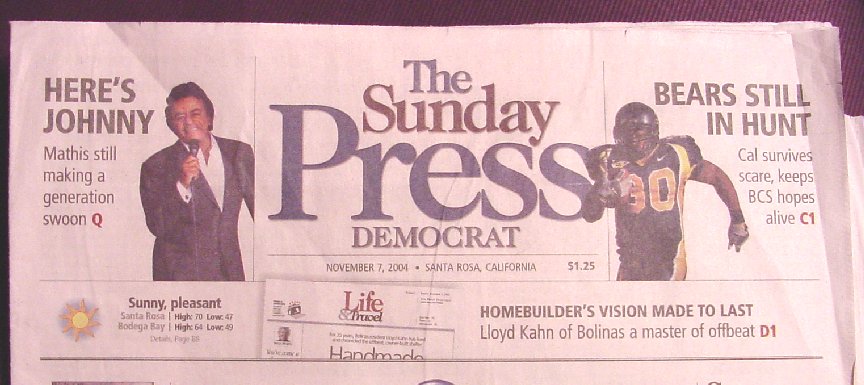



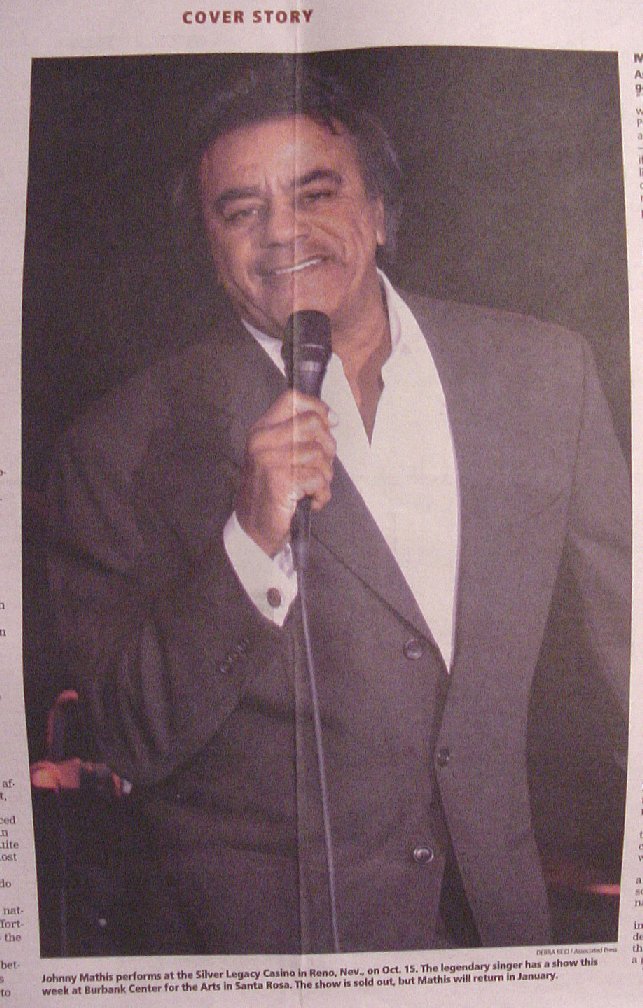
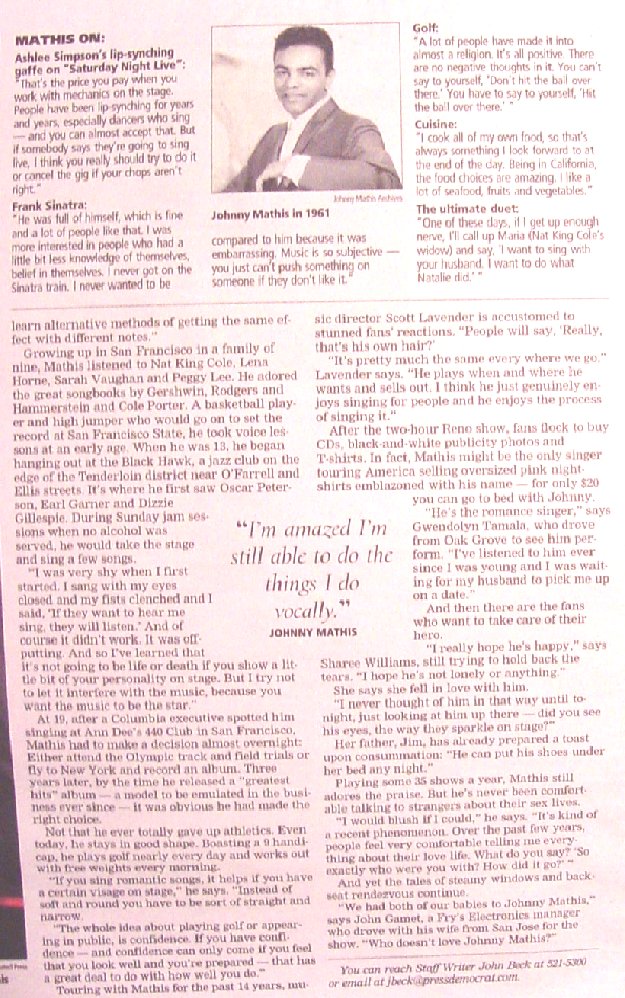
My Foolish Heart sent me these articles and pictures from "Best Bets", a Reno periodical from October 14, 2004. It if fun to note that the shirt John is wearing, was given to him on his birthday by our own Foolish Heart herself. Thanks so very much, Sue.
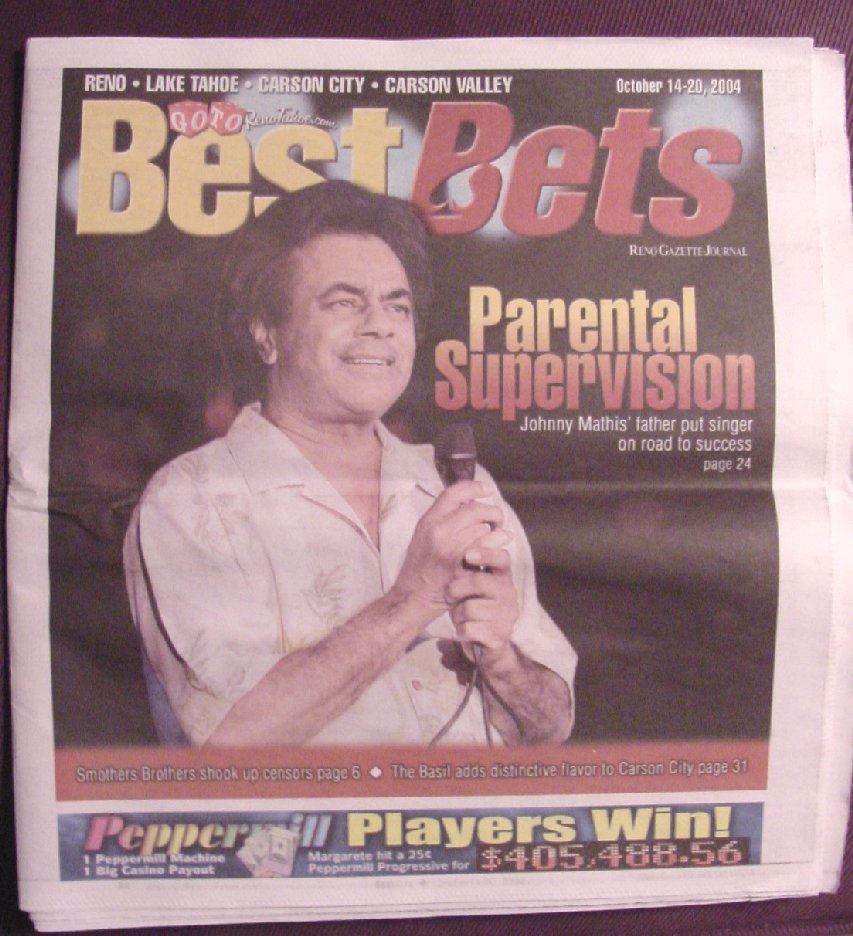




Concert Review
It's typically not a good sign when a performer takes a break 40 minutes into the show, sends out a comedian for 30 minutes and then has a 15-minute intermission. But when that performer is 69-year-old Johnny Mathis, the audience doesn't really seem to mind.
Thursday night, the Paramount was almost three-quarters filled with fans such as Miriam Peterson, 84, who came in a limo from Port Ludlow with a group of fellow real-estate agents. They had twinkles in their eyes before the show just talking about "the old-time" songs they hoped he'd sing.
Concertgoers made a beeline for the merchandise table as soon as the doors were open, snatching up $10 glossy programs chock-full of Mathis photos with big wavy hair.
Framed by a nearly 30-piece orchestra — complete with conductor/pianist Scott Lavender, who also sang falsetto backup on a few tunes — Mathis gave a solid if low-energy, staid performance, crooning a little more than 20 songs throughout the night.
The now shorter-locked Mathis provided his take on ebony and ivory, appearing onstage in a white suit and casual, open-collar shirt — and after comic Derrick Cameron's appearance and the intermission, in a black tux.
Youthful in the face but at times unsteady on his feet, he appeared overwhelmed by the rousing applause that greeted him (putting his hand on his heart several times). In return, he treated the crowd to classics like "Life is a Song Worth Singing," the soulful "I'm Stone in Love with You," "It's Not For Me to Say" and the Erroll Garner-penned "Misty."
Vocally, Mathis opts for the low notes these days versus the high, and he often cuts the long, soaring notes of yesteryears down to a whisper. He is occasionally accompanied by piped-in backup singers, though he himself never appeared to lip-synch, à la Ashlee Simpson.
While content to revisit the classics, the singer truly became animated in the second half of the show, when he reminisced about his first trek to Brazil and played several bossa-nova-inspired songs, including "Brazil." Accompanied by guitarist and production manager Gil Reigers, Mathis seemed entranced in this segment of the show by the music, and he did a little dance step that may have been a samba.
All that action, and singing about a land "where the songs are passionate," appeared to do the singer in, and he strode off stage.
Mathis then returned for one more song, treating the audience to "How Do You Keep the Music Playing?" and accepted a bouquet of roses from a fan before heading backstage for good.
Copyright © 2004 The Seattle Times Company
Johnny Mathis: For fans, at least, wonderful
By Mary Guiden
Special to The Seattle Times
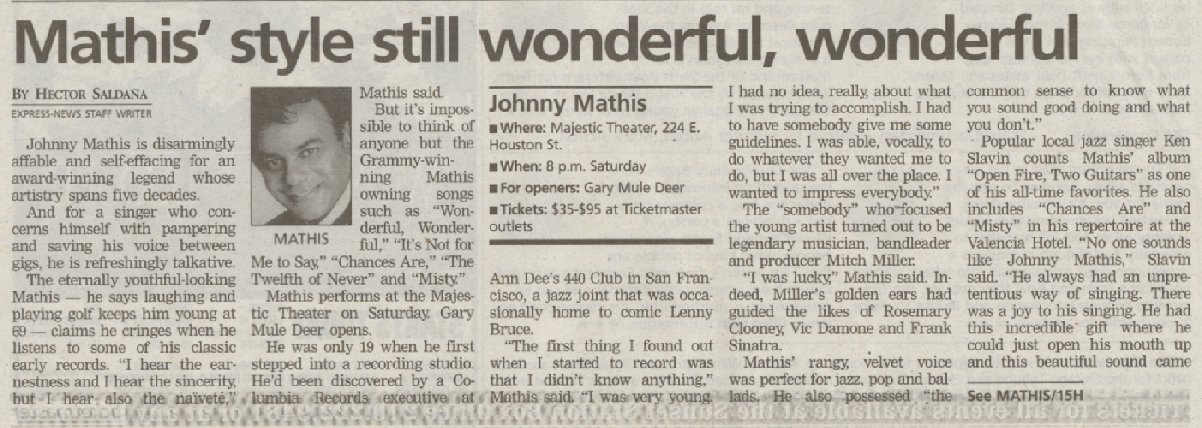

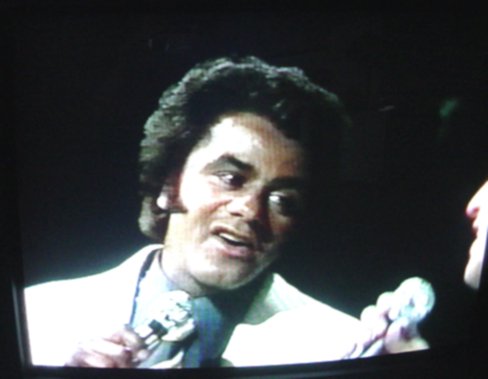
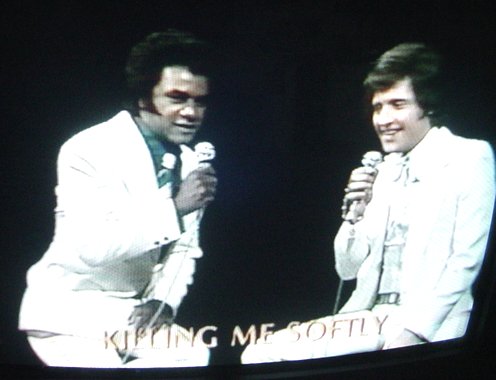
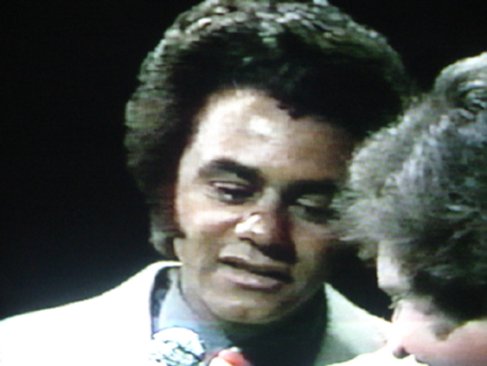

Starbucks and United Airlines Enter Into Three-Year Supply and Cooperative Marketing Agreement
ELK GROVE VILLAGE, Ill., and SEATTLE, Aug. 18 /PRNewswire-FirstCall/ -- Starbucks Coffee Company (Nasdaq: SBUX - News) and United Airlines have extended their successful relationship with a new three-year supply and cooperative marketing agreement under which Starbucks® coffee will continue to be the exclusive coffee for United Airlines and Ted flights worldwide.
The first collaboration under the new agreement will appear in September, when United presents a poignant in-flight entertainment program based on Ray Charles Genius Loves Company - a set of recordings jointly released by Starbucks, through its Hear Music brand, and Concord Records. The final recordings of Ray Charles' career, the performances feature Ray Charles singing with several of his favorite artists, including Natalie Cole, Elton John, Norah Jones, B.B. King, Gladys Knight, Diana Krall, Michael McDonald, Johnny Mathis, Van Morrison, Willie Nelson, Bonnie Raitt, and James Taylor.
United's in-flight video entertainment will include a half-hour program that will virtually put passengers in the recording studio for the making of the album - allowing viewers to experience interviews and performances from the recording sessions. Additionally, United's audio entertainment in September will feature the entire CD interspersed with interviews by artists appearing on the recording. The CD will be available at participating Starbucks stores nationwide during September.
"We are delighted to extend and expand our relationship with Starbucks, the premium coffee retailer in the world," said Glenn Tilton, Chairman, CEO and President of United. "Starbucks coffee and our excellent onboard service are two of the reasons why our customer satisfaction ratings are at historically high levels. It's time for this partnership to fly."
"Since 1996, we've been proud to serve Starbucks coffee to millions of customers on United flights around the world, and we look forward to continuing and broadening our relationship by taking it to another level," said Howard Schultz, chairman of Starbucks. "By sharing this touching video of Ray Charles and the artists that performed with him in his final recording sessions, we hope to pay tribute to Mr. Charles' legacy and provide a glimpse of the innovative programs that will give travelers yet another reason to fly United."
TCS1981 sent this article in about Ray Charles' new CD.
A review in the Village Voice of Genius Loves Company, and finally something positive about Johnny and Ray's performance on "Somewhere Over The Rainbow."
HERE
Wednesday August 18, 9:01 am ET
Expanded Relationship to Launch with In-Flight Video Onboard United and Ted Flights Featuring Behind the Scenes Footage of the Ray Charles Genius Loves Company Album

Ray Charles compels 12 disciples to tell us just exactly who they are
One memorable scene in "Diner," Barry Levinson's love letter to 1959 Baltimore, has the characters in their Fells Point hangout pondering a serious question: Who's better, Sinatra or Mathis? It might seem hard to believe now that Frank and Johnny were once considered equals, as Ol' Blue Eyes went on to become larger than life, while Mathis seemed perpetually frozen in the romantic swoon of "Chances Are." Forty-five years later, Mathis is still singing the ballad that was his first No. 1 hit, and the adoring crowd that filled Wolf Trap on Monday night to hear him drank in every sweetly wavering note as if time had suddenly stood still. Besides Mathis's amazingly youthful appearance -- he'll be 70 next year but hardly looks a day over 45 -- the striking thing about Monday's show was the power that his voice still holds. In front of a full orchestra that mostly steered clear of contemporary schmaltz and got a decent approximation of his glorious AM arrangements, Mathis was able to make standards such as "It's Not for Me to Say" or "The Twelfth of Never" ripple with emotion. Though he doesn't tour diligently anymore -- his official Web site has as much information on the state of his golf game as his music -- Mathis still clearly enjoys his craft. And the audience swooning throughout his two half-hour sets knew that the romantic cool of "Wonderful! Wonderful!" will never go out of style.
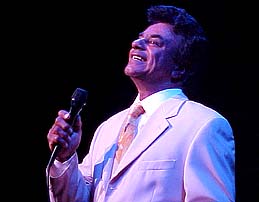
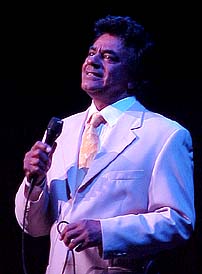
The link to this story, for as long as it is available is HERE




This is a new article sent in by TCS1981 on Mar 22, 2004. This story on Johnny Mathis was in the Scripps Treasure Coast Newspapers in Stuart, FL on Friday 3/19/04 - this includes the Sebastian Sun, Vero Beach Press Journal, Fort Pierce/PSL Tribune, Stuart News, Port Lucie News and Jupiter Courier. Thanks, TCS for sharing this neat article.
JOHNNY MATHIS GAVE UP BASKETBALL FOR MUSIC
By Wayne Bledsoe Scripps Howard News Service March 19, 2004
There are only a handful of vocalists who are distinctive from the first note that they sing. Of that small group, Johnny Mathis may be the most recognizable. Mathis' mellifluous voice has calmed generations and stands totally apart from the over-the-top singing style of most modern vocalists. "The man that influenced me most was Nat Cole," says Mathis. "He had a limited range, but we're all products of our limitations. His voice was always so perfect. He never tried to do anything beyond himself. But it was his reading of lyrics. It was absolutely perfect." Mathis' love of Nat King Cole's music is one of the few things about Mathis, who performs this week at the Kravis Center, that aren't surprising. It's a surprise to learn that the gentle voice that crooned out the pop classics "Chances Are," "Wonderful, Wonderful" and "Misty" belonged to a high-school and college sports star - a man who once hated his own voice. Mathis was born in Gilmer, Texas. He and his family moved to San Francisco when he was 5. One of seven children, Mathis showed both musical and athletic talent early. His father, Clem Mathis, a sometime pianist, encouraged his son's music. When his son was 13, Clem enrolled him in music lessons. "At the time, I didn't like my voice. I had a sort of nasally young voice." He became a sports star at George Washington High School and San Francisco State College. "I played basketball with Bill Russell and Casey Jones," says Mathis. "And I was a high jumper." In fact, Mathis set a high-jump record of 6 feet, 5 1/2 inches for the school, which was only 2 inches short of the Olympic record of the time. In 1956, Mathis was set to compete in the Olympic trials for the high jump. However, other things had come up. For the past year, Mathis had been singing at a San Francisco nightclub called Ann Dee's 440 Club. The owner had convinced Columbia Records executive George Avakian to come hear her young performer. At the end of the night, Avakian sent a telegram to New York that stated: "Have found phenomenal 19-year-old boy who could go all the way. Send blank contracts." Mathis' first recording session in New York was scheduled for the same week as the Olympic trials. Mathis chose to follow music. Avakian, head of artists and repertoire for Columbia jazz, teamed his young talent up with jazz players. And Mathis did indeed love jazz. That first album featured a wealth of talented players, but went nowhere. Mathis' next recordings were smooth pop ballads, including the future Top 20 hit, "Wonderful, Wonderful." In 1957, Mathis hit the Top 20 with "Wonderful, Wonderful," "It's Not for Me to Say," "Chances Are" and "The Twelfth of Never," beginning a string of successes that would stretch into the next three decades. Mathis says that he has never been able to listen to his music without hearing the flaws. "Only maybe two songs, 'Chances Are' and 'Misty,' felt like I got through them without any train crashes," says Mathis with a chuckle. While Mathis' recordings have become pop classics, he's had only two No. 1 hits - "Chances Are" and a 1978 duet with Deniece Williams, "Too Much, Too Little, Too Late." Mathis instead became one of the early artists who sold more albums than he did singles. His disc "Johnny's Greatest Hits" (1958) spent 490 weeks on the charts, and "Heavenly" (1959) remained on the charts for 295 weeks. While Mathis became a star, he was not always comfortable in the role. He guarded his private life, and he had a bad case of stage fright for much of his early career. "It felt so unnatural to be a man onstage singing the innermost feelings of his heart," says Mathis. He admires the work of Ella Fitzgerald and Sarah Vaughn - "They could improvise, write their own melody in their heads," says Mathis. "And I listen to Patti Austin, Michael McDonald, Aretha Franklin, Gladys Knight, Stevie Wonder. ... " While Mathis says he has always been a fan of beautiful voices, some of his favorite singers didn't have the best voices. "Mabel Mercer, by the time she was famous, she was in her late 70s and she had almost no voice at all, but she was extraordinary," he says. "If you have the spirit and a righteous quality about what you sing, you don't have to have a great voice."
Thanks to TCS1981 for this group of items from the Arizona and New Mexico concerts.
